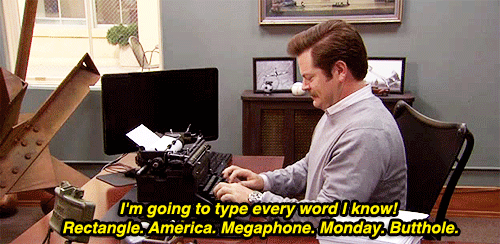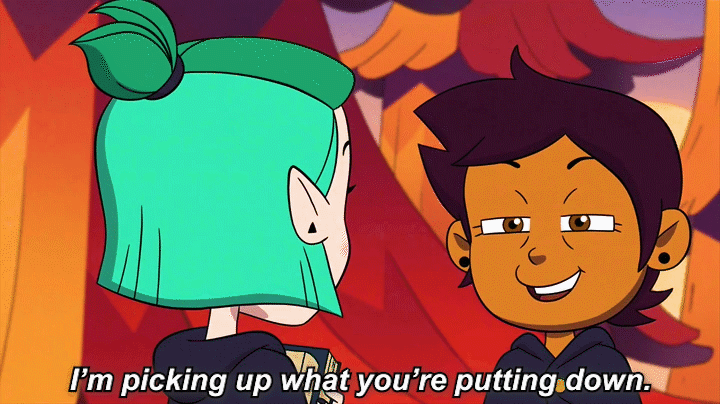
Hello my lovely blog peeps! Thanks for reading. No, seriously, thanks for reading. I’m not sure what I’ve been doing right, but I have over ten views on my last blog which is AMAZING. So whether you come for my killer GIF usage, my witty mountain-man humor, or because you’re fulfilling some cosmic community service by visiting sad, unpopular blogs, I APPRECIATE YOU.
Today, I wanted to share me absolute favorite part of the writing process with you: Line Level Revisions. To be clear, I’m not talking about the level of intensity you get when an editor sends you back line edits that make you question everything you know about comma usage, verb tense, and phrasing. (Look, I’ve only ever experienced that level secondhand, but I still loved it!)
No, I’m talking about personal line level edits as you revise your manuscript and figure out the best way to phrase things in order to convey your story. This is my favorite part of writing. I find drafting difficult (although less so now that I spend more time plotting...imagine that *shrug*), but once I have a base, I’m ready to go line by line and pick it apart. I’ll spend hours agonizing over the right word and I basically take up residence at thesaurus.com, where I happily sip my tea, eat my chocolate-chip-less cookies, and click through lists of words to find THE BEST MOST PERFECTEST ONES EVER.

Disclaimer, I do not advocate the use of the thesaurus to find wonky, archaic words to make yourself sound smart method. But our language does have a lot of words and I can’t keep them all in my head, so Thesaurus Friend helps to remind me of them and it usually helps to clarify connotation. But hey, if that’s how you roll with a thesaurus, MORE POWER TO YOU.
In today's blog I’m going to dissect two paragraphs I wrote and analyze each line for intent, word choice, and my specific reasons for those choices. I definitely believe that as a writer, you have to be able to analyze your writing and be able to fully articulate the reasons behind each and every choice you made.
(CW: Parent/Child relationships both good and bad)

So, one of my stories has this adorable monster boy, Finian (who, when he’s 18, happens to look exactly like Bellamy Blake from The 100 S1-4). And he has a very strained relationship with his father. (TL&DR: emotionally abusive, disowned him, tried to kill him). So, the feelings that Finian has when he thinks about or is confronted with the concept of ‘father’ is not positive. His position is very far away from my own personal experiences and outlook on the concept of father, as well as being pretty far removed from the societal expectation of a father/son relationship.
And so I get to play around with the language I use in the story to show this. Okay, pull on your nerd pants, cuz HERE. WE. GO.
SNIPPET:

Okay, so this was SO FUN. First, scene context: Finian is 9 years old and just demonstrated his skill with shooting a gun and it was perfect, like he should have won an Olympic gold medal. (srsly, this boy needs a hug and a large piece of cake)
Sentence One:
Hands folded behind his back, Finian’s fingers fidgeted.
Okay, first, look at that lovely alliteration we have going on with Finian’s fingers fidgeted--it just has a lovely ring to it and I love alliteration so when I can do it, I totally opt for words that create that pattern. Second, I could have had said he was nervous, or I could have chosen a different nervous tic. I chose his fingers moving behind his back--where it isn’t visible to the world (or his father). This not only shows that he's aware that he has to keep his emotions hidden from the world, but as we read the rest of the paragraph, we realize how significant this nervous tic is. This kid is proficient at handling firearms at the age of 9, so he really shouldn’t be fidgeting. This was a deliberate twist as we start out in one emotional state, only to learn that he should be the exact opposite emotionally.
The rest of that first paragraph is his own assessment of his skill AND it shows you so much about his own mental state and who he is AND it showcases his relationship with is father. First off, he knows he’s good and he has specific criteria to backup that assessment. Second, Finian is aware that despite his skill, he is unsure how his father is going to react. My goal here was to have that childlike overconfidence in the face of indisputable facts that don’t take into account the emotional perception we have as adults. But at the same time, kids are lie detectors--they know when you are aren’t being honest with them, even when it’s to *protect* them. And Finian has that inkling, he knows enough that despite the irrefutable facts of his proficiency, his father might still be disappointed.

Also of note in this paragraph is the reverence Finian has for the pistols. They are perfection. They are home. He feels more kinship with these weapons than he does with his own family. (Which, is probably a good thing because his family is terrible. If you think his father is a jerk, just wait until you meet his sister)
Are you at peak nerd yet? No? Okay, let’s tackle the second paragraph.
I have his father “striding” toward him. Not walking, not moving, not running, or swaggering, or skipping...omg, could you imagine if this jerk-face of a character skipped over to his son? But that’s exactly it, it would completely change the tone and mood, this would go from being a beat of intense emotion to something farcical. So with just that one word we get a lot of characterization for Finian’s father. People who stride have purpose, they have presence. It serves to heighten the tension because things are happening quickly.
I love my second sentence here. We have: panicked paired with father and embrace. So, usually, people are happy to be embraced by their father, especially after a display of skill that they know will impress said parent. But poor bb Finian, goes from epic levels of happiness to panic in a heartbeat at the thought that his father might hug him as a way of congratulating him. He flinches. Again, the standard reaction to a hug is NOT a flinch, especially between a parent and a child.
I chose to use the word father rather than dad, daddy, pops, papa or any other iteration, which adds a level of formality to Finian’s relationship with his father. Father has less warmth to it than choices like dad or daddy or papa and immediately sets up the readers expectations. And by ending with a handshake between this man and his 9 year old son, I’ve really solidified the emotional distance that exists between them.
All of these were very conscious decisions on my part in order to convey their relationship as quickly as possible. This truly is my favorite part of writing and when I get to the revision stage I have these in depth thoughts about every line. Every word in a story has to be intentional and whenever possible, if it can pull double or even triple duty, then even better. I feel that the first paragraph of my example really does a lot of heavy lifting.
Learning how to analyze your own writing the same way you might have analyzed a text for your high school or college English class is a highly useful skill. You’ll notice that my explanation was WAY LONGER than the actual text itself. As an English teacher, I’m proud of my analysis. And tbh, I think it’s important to have this kind of relationship with your own writing.
Why? Because if you can’t explain it and justify each and every word as the best choice, then you *might* not have the understanding of your writing that you think you do. You might not be conveying the message or meaning that you think you’re conveying. Being able to dissect every word and find places where you can really home in with a zinger that pulls in two or three ideas instead of just one will make your writing stronger.

I highly recommend taking the time to sit with a paragraph or two of your own and to pull it apart piece by piece. Examine each sentence, each word and make it the best it can possibly be. If you have a solid CP, give them the same text and ask them to write an essay about it. Pretend you’re back in high school, but this time you don’t have to use MLA formatting or have parenthetical citations (I mean, unless you want to be self-indulgent and put your name and the page number in there like someone really was citing you!) And then have a discussion about it. Did they pick up what you were putting down? If yes, FANTASTIC. If not, then you have some work to do to figure out where it went off the rails.
Every reader will focus on different aspects of a text and their reading will be their own. It might have the same general ideas, but the details is where it starts to get personal based on the baggage they bring with them when they read. So you have to keep that in mind as you get outside reactions to your writing.
What is your favorite part of the writing process? Do you love getting into the nitty gritty of your words or would you rather just draft and not have to parse out the details? Leave me a comment! (also, a note on the comments, it's like one long continuous comment thread? Because I am not yet savvy enough to figure out a better way to do this. BABY STEPS.)
